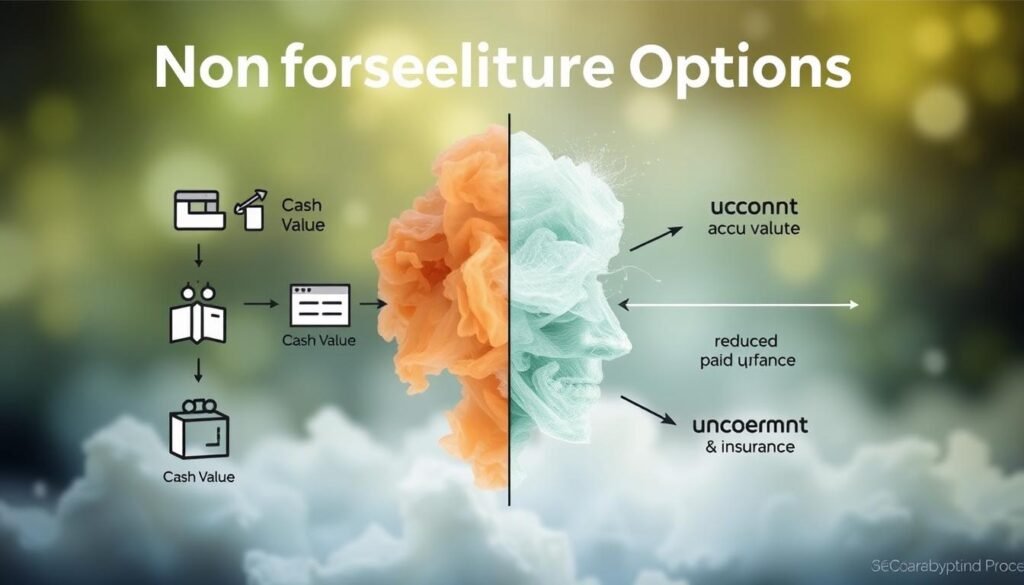Exploring life insurance can be complex. You might have seen the term “nonforfeiture option.” But what are the uncommon choices in this field? Whole life insurance usually has three main options: cash surrender value, extended-term insurance, and reduced paid-up insurance. Yet, some companies offer other, less known options.
Have you heard of a single-premium, immediate annuity or an automatic premium loan? These options let policyholders use the policy’s cash value if they can’t pay premiums anymore. But are these choices as common as the usual ones?
Key Takeaways
- Life insurance policies usually have three main nonforfeiture options: cash surrender value, extended-term insurance, and reduced paid-up insurance.
- Some insurance companies offer less common options, like a single-premium immediate annuity or an automatic premium loan.
- These uncommon options let policyholders use the policy’s cash value without giving up the policy completely.
- Knowing about different nonforfeiture options helps you choose the right life insurance policy.
- The U.S. life insurance rules are mainly set by state laws, with the National Association of Insurance Commissioners (NAIC) also playing a big role.
Understanding Nonforfeiture Options in Life Insurance
A nonforfeiture clause is key in life insurance. It protects your investment. If you stop paying premiums, you can get full or partial benefits or a refund. Knowing your options helps you make smart financial choices.
What Is a Nonforfeiture Clause?
A nonforfeiture clause is a life insurance feature. It keeps your investment safe by offering choices if you can’t pay premiums anymore. This way, you don’t lose all your policy value.
Standard Nonforfeiture Options
The three main nonforfeiture options are:
- Cash Surrender Value: You can get the remaining cash surrender value of your policy. This might be less than the total cash value because of policy costs.
- Extended-Term Insurance: This option lets you buy a new, shorter-term life insurance policy. It uses your policy’s cash value and keeps the same death benefit.
- Reduced Paid-Up Insurance: You can keep a smaller death benefit without paying premiums anymore. It’s based on your policy’s cash value and how many premiums you’ve paid.
These options let you use your policy’s cash value if you can’t pay premiums anymore. This way, you don’t lose your investment completely.
Uncommon Nonforfeiture Options
While most people know about cash surrender value, extended-term insurance, and reduced paid-up insurance, some companies offer other choices. These include the single-premium, immediate annuity and the automatic premium loan.
Single-Premium, Immediate Annuity
The single-premium, immediate annuity lets you turn your life insurance’s cash value into a steady income. It’s great for those who don’t need or can’t afford their life insurance anymore.
Automatic Premium Loan
The automatic premium loan is another rare option. It lets the insurance company use your policy’s cash value to pay your premiums. This helps if you’re having trouble paying on time.
These options give you more choices if you can’t keep up with your life insurance payments. They offer ways to keep some coverage or financial safety net.

| Nonforfeiture Option | Description |
|---|---|
| Single-Premium, Immediate Annuity | Allows the policyholder to convert the cash value into a lifetime stream of payments |
| Automatic Premium Loan | Allows the insurance company to use the policy’s cash value to pay overdue premiums |
What is not considered to be a common life insurance nonforfeiture option
There are three main nonforfeiture options in whole life insurance: cash surrender value, extended-term insurance, and reduced paid-up insurance. But, some insurance companies offer less common choices. These include a single-premium, immediate annuity and an automatic premium loan.
These special options might not be in your policy by default. You need to choose them yourself. Always check your policy documents to see what options you have.
| Nonforfeiture Option | Description |
|---|---|
| Single-Premium, Immediate Annuity | This option lets you use the cash value to buy an immediate annuity. It gives you a steady income for life or a set time. |
| Automatic Premium Loan | This option lets the insurance company use your cash value to pay premiums. It keeps your policy from lapsing if you can’t pay. |
Even though these options are not as well-known, they can be very helpful. They offer ways to keep your life insurance going even when things get tough. Knowing all your options helps you make choices that fit your needs.

“Nonforfeiture options are crucial safeguards that protect policyholders’ interests when they can no longer afford to pay their premiums. Exploring the full range of options, including the less common ones, can help ensure coverage continuity and financial security.”
Importance of Nonforfeiture Clauses
Nonforfeiture clauses are key in life insurance. They protect policyholders’ interests and prevent them from losing policy value if they can’t pay premiums. These rules are set by states, with help from the National Association of Insurance Commissioners (NAIC). This ensures companies offer fair options to consumers.
Protecting Policyholders’ Interests
These clauses help policyholders keep the cash value they’ve built up. Even if they stop paying premiums, they can still access this value. This is crucial during tough financial times.
State Regulations and Guidelines
Insurance companies must follow state rules for nonforfeiture clauses. These rules help ensure policyholders get good options. For example, they might choose cash surrender, reduced paid-up insurance, or extended term insurance.
Nonforfeiture clauses are vital. They protect policyholders’ interests and follow state rules. These clauses help policyholders make smart choices about their insurance, especially in hard times.

| Nonforfeiture Option | Description | Advantages |
|---|---|---|
| Cash Surrender | Policyholders receive the policy’s current cash value as a lump sum payment. | Provides immediate access to accumulated funds, but may result in a lower death benefit. |
| Reduced Paid-Up Insurance | The policy is converted to a smaller, paid-up policy with a lower death benefit. | Maintains some life insurance coverage, though at a reduced amount. |
| Extended Term Insurance | The policy’s cash value is used to purchase term life insurance for a limited period. | Provides the highest death benefit, but coverage may only last for a specific duration. |
Conclusion
Standard options like cash surrender value and extended-term insurance are common in whole life insurance. But, some insurers also offer less common choices like single-premium immediate annuities. Nonforfeiture clauses protect consumers by allowing them to keep policy value, even if they can’t pay premiums anymore.
Knowing about these options helps you make smart choices for your life insurance. Whether you pick a standard or a less common option, it’s crucial to understand the details. This ensures your policy meets your financial goals and needs.
Choosing a life insurance strategy should focus on your family’s financial safety. By grasping the details of nonforfeiture options, you can confidently make the right choice for your situation.
FAQ
What is not considered to be a common life insurance nonforfeiture option?
While whole life insurance policies usually have three main options – cash surrender value, extended-term insurance, and reduced paid-up insurance – some companies offer less common choices. These might include a single-premium immediate annuity or an automatic premium loan.
What is a nonforfeiture clause?
A nonforfeiture clause in a life insurance policy lets the policyholder get full or partial benefits or a refund if they stop paying premiums. It helps protect the policyholder’s investment.
What are the three standard nonforfeiture options?
The three main options are cash surrender value, extended-term insurance, and reduced paid-up insurance. These choices let the policyholder decide how to use the cash value if they can’t pay premiums anymore.
What are the less common nonforfeiture options?
Less common options include a single-premium, immediate annuity. This turns the cash value into a lifetime income stream. Another option is an automatic premium loan, where the insurance company uses the cash value to pay overdue premiums.
Why are nonforfeiture clauses important?
Nonforfeiture clauses are key because they safeguard policyholders’ investments. They ensure that if someone can’t pay premiums anymore, they won’t lose the value they’ve built up in their policy. These clauses are regulated by states and the NAIC to ensure fair options for consumers.
